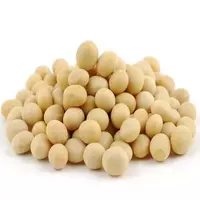Soy

Soya appeared in China, where its name sounds like "shu, " which means "big bob. " Soybean cultivation in this country began as early as the third millennium BC. Later, the taste and nutritional properties of soybeans were also appreciated in Japan, from where it came to Russia during the Russo-Japanese War, that is, relatively recently.
Soybeans are perhaps the most controversial vegetable now eaten. Scientists are still fiercely arguing about the benefits and harms of soybeans. One way or another, soybeans are included in the diet of each person, because they are added to a wide variety of semi-finished products, sausages, pasta and confectionery, mayonnaise.
Soybean benefits
Soy is 40% protein and forms the basis of vegetarian nutrition. The protein in soybeans is almost
2. 5 times more than in meat. And this protein is saturated with amino acids and is perfectly absorbed. The composition of soybeans generously contains fatty acids, phospholipids that contribute to the purification and improvement of the liver, isoflavones that help in the fight against cancer cells, tocopherols that increase immunity and significantly slow down the aging processes of the body and generally increase life expectancy. A significant place in the composition of soybeans is occupied by easily soluble sucrose, glucose, fructose, starch and pectin.
The useful properties of soybeans are not limited to this. It is a source of a wide variety of vitamins, macro- and trace elements. For example, it contains calcium, phosphorus, potassium, magnesium, silicon, iron, boron, iodine and others. Such a rich composition unequivocally speaks of the benefits of soybeans for human health. In particular, thanks to this culture, the risk of developing atherosclerosis is reduced, the level of harmful cholesterol in the blood is reduced. Soy helps in the fight against harmful bacteria. It is indispensable for the prevention and treatment of diabetes mellitus, because the elements included in its composition contribute to the production of insulin. Soybeans become vital for animal protein allergies. It is recommended for diathesis, ulcers, hepatitis, as well as for psoriasis, anemia, intestinal disorders.
Harm to soybeans
The main harm of soybeans is that with the development of genetics and its unpredictable experiments, the risk of acquiring genetically modified soybeans instead of natural soybeans has increased significantly. And until the end, the consequences of the use of this product for the human body, unfortunately, have not been clarified. Soy is not recommended for people with endocrinological diseases, since the substances included in soy slow down the processes of producing thyroid hormones. You also need to be careful with soy during pregnancy. So, the harm of the product, although not obvious, remains one of the most discussed issues in modern science.
Among other things, soybeans are a record calorie product. Its calorie content is 364 kcal. 100 gr. product, so people who are dissatisfied with their figure, soy is better not to get carried away.
soy 364 kCal
Energy value of soybeans (Ratio of proteins, fats, carbohydrates - ju):
Proteins: 34.9 g (~ 140 kCal)
Fats: 17.3 (~ 156 kCal)
Carbohydrates: 17.3 (~ 69 kCal)
Energy ratio (bj | y): 38% | 43% | 19%
 Español
Español Français
Français Português
Português Русский
Русский 简体中文
简体中文 繁體中文
繁體中文 日本語
日本語 한국어
한국어 العربية
العربية Türkçe
Türkçe Қазақ
Қазақ Deutsch
Deutsch Italiano
Italiano Українська
Українська
